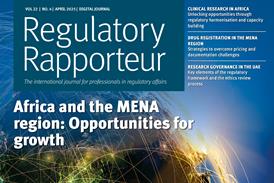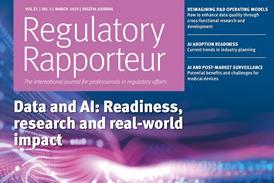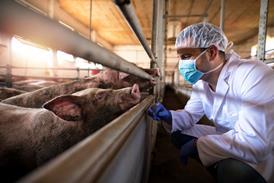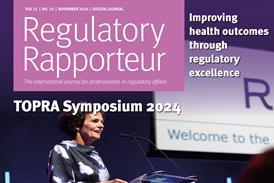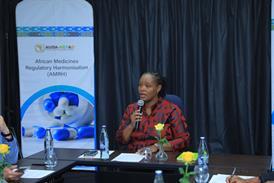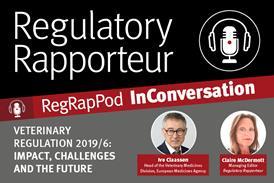Kate Betteridge, Global Regulatory Portfolio Lead at Pfizer, and winner of the ‘Inspiration’ award at the 2024 TOPRA Awards for Regulatory Excellence, discusses strategies for harnessing innovation and creativity and her role in developing the regulatory professionals of the future.
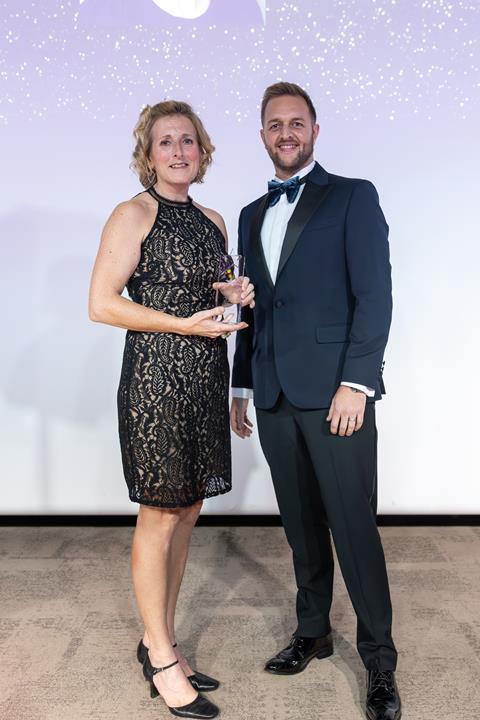
Q: Can you tell us a little bit about your current role and your areas of expertise?
A: In my current role as Global Regulatory Portfolio Lead at Pfizer, I have two parts to my job. One is the technical delivery of a portfolio, which covers internal medicine products, as well as those relating to rare diseases. The technical delivery of a product portfolio can start at any stage of development, but I travel with a product all the way through its lifecycle. This can include working with very early candidates before a product goes into the clinic, continuing with the process to keep it on the market and making sure it’s safe and effective for patients.
The second part of my job is managing a lovely team of global regulatory strategists, who define the strategy for the different assets that we look after. They can either be regional leaders, who cover territories such as the US, the EU or emerging markets, or global strategy leads for a particular product.
I have built a diverse set of experiences at Pfizer, bringing gene therapy approvals through, and gaining a specialism in the haematology space, including in rare diseases such as sickle cell disease. In addition, I now look after large brands that cover heart failure and other big internal medicine areas of disease.
I suppose I consider myself to be a conduit between the troops on the ground and senior leadership. I’m very much a bridge between the two in terms of inspiring others, getting the work done, but also managing senior leaders and their needs.
Q: What led you to a career in regulatory affairs?
A: Regulatory affairs is something I came to quite late in my career. At school, I had a passion for science, studied pharmacology at university and then completed a PhD in the subject.
I was very much focused on drug development – how drugs act on the body fascinates me – but I realised I didn’t want to be a bench scientist. I moved into business, working at the Centre for Medicines Research (now the Centre for Innovation in Regulatory Science (CIRS)) and was involved in a range of different projects, which then led me into regulatory policy work. From there, I moved to Pfizer as an entry-level regulatory strategist. It was quite an unusual way of getting into regulatory affairs: typically, people work in product strategy before moving into the policy space, because you can then understand the bigger landscape and what you’re trying to achieve, but I was still working out which part of regulatory affairs was most interesting to me.
Working at the Centre for Medicines Research was extremely inspiring, especially the work being done at the time on benefit-risk, emerging market territories, health technology assessments and how that interlinks with regulatory affairs. When I moved to Pfizer, I was able to demonstrate this knowledge and I’ve been here almost 17 years.
Regulatory affairs is such a great space because if you don’t want to be a scientist, you can use your business skills and apply that to science, whether that’s commercial skills or softer skills, such as people management.
I’ve enjoyed my career at Pfizer; every single day in regulatory affairs is different and there’s always a new challenge. I have a personal passion for rare diseases, where patients have limited or no medicines at all, and that’s what gets me out of bed each day.
Q: What skills do you think have been particularly important during your career advancement?
A: All the TOPRA training I’ve done has been excellent as a vehicle for really understanding the industry, in particular the introductory course when I was more junior. I’ve enjoyed other courses since and have now moved on to running a course myself on regulatory affairs and health technology assessment and the intersection between the two.
Scientific training is also extremely helpful. I have a PhD and, while I don’t think you necessarily need one in this space, I think it helps in understanding the science deeply. In regulatory affairs, you’re often explaining areas of science that you may not be the expert in, but you need to be able to understand and convey them in a way that others can understand.
Having a range of qualifications and experiences can give you a variety of options within drug development. When you think about the landscape now, cell and gene therapy is very specific, and having some technical understanding of it is really helpful. It’s very specialised, so from a technical perspective, I would say learning agility, and having a desire to learn continuously will always help. You will always have to learn in regulatory affairs; nothing stays still and the regulations, the feedback and the digital landscape are always changing.
On the soft skills side, being a good communicator, and being able to step outside your comfort zone is extremely important. As you progress in your career, you will take on more challenging interactions, whether that’s internally within your company or dealing with regulators and people that are scientific experts globally or regionally. That can feel daunting, so having those skills is really valuable.
One of the most important things for me as a portfolio manager and a line manager is to invest my time in people. It’s people that get the work done and that’s how we create the culture that we want to work in.
Q: Your award nomination mentions that you developed the UK regulatory undergraduate programme at Pfizer. What is this and how did you go about that?
A: For well over a decade in the UK, Pfizer has had undergraduates that join us for a ‘sandwich’ year as part of their degree course. We’ve always had students that come into regulatory affairs, both within regulatory strategy, but also within areas like regulatory operations and labelling, for example.
I’ve always wanted to be a people manager and, as a stepping stone to that, I volunteered to manage a student that came into Pfizer. I did that for many years, and it became clear to me that within the Pfizer regulatory affairs organisation, we had many people like me doing the same; giving similar introductions about what it’s like to work in our company and sharing the sort of things they needed to know. There was an opportunity to band together and so I helped design a curriculum.
As students came in each year, we had a set way of training them so they could upskill as quickly as possible. With so many acronyms and processes to learn, an obvious efficiency was to bring them together and train them in groups on different topics. It also gave managers an opportunity to practise their training skills. One thing we heard from our students year after year was that they wanted support on presentation skills, so that became a central pillar of the training. The students have training on giving both informal presentations and more technical presentations. At the end, they have to do a pitch where they’re all competing for a prize, so that’s a nice way to finish the course. While the elements of the course started off being about efficiency, it became clear that the more we helped the students to develop, the happier they were and the better they delivered on their work.
We’ve now seen the full circle, where those students then come back to the company after graduation; they see the investment, the great people and the great work that we do. Walking down the corridor earlier, I’ve seen many of the students that I either recruited or interviewed. They may not work with me directly, but I know them because they were part of the cohorts that we train each year. You make the effort and then you reap the benefits and it’s great for them too, because they feel supported, and they really enjoy working for the company.
Q: You’ve been instrumental in developing a more inclusive workplace in Poland and India. How has that been achieved? And how has this has aided collaboration and performance across those territories?
A: We’ve been looking at different operating models at Pfizer for many years, and that presented an opportunity to recruit colleagues in India and Poland. As I previously mentioned, one of the values at Pfizer is equity, so to me, the geography is irrelevant. We can still get the work done, even if we have to find different ways of doing it.
Recruiting in different locations has allowed us to leverage time zone differences and depth of experience. There’s a very high level of academic excellence in many territories and it’s been fantastic to expand into those areas, work with those colleagues and really bring them centrally into the team.
We’ve also looked at implementing the ‘follow the sun model’ workflow, so that we can work as a regulatory enterprise almost 24 hours a day. There’s a lot of cultural differences, but it’s really about approaching that with an open mindset. This is where learning agility is absolutely central. You don’t know what people’s backgrounds are unless you’ve been immersed in those cultures and countries. So having that approach, asking questions, and being open to that new space across geographies is an amazing opportunity. It is a real eye-opener and I learn something every day from colleagues that are outside my usual areas and regions.
Q: You’ve been praised for inspiring innovation and creativity across global regulatory sciences. What would you say are the key skills needed to inspire colleagues to reach their full potential?
A: You definitely have to have a growth mindset, and the ability to consider feedback or other ideas and start merging them with your own.
Resilience is also essential, and making sure that when the answer’s no, you’re falling forward, not falling back. Feedback to me is always an opportunity to learn and think about how I can do something differently to get a better outcome.
Stepping outside your comfort zone and creating opportunities is also important. It’s those opportunities that lead on to the next thing. When I’m talking to my team, or working with someone new, I spend a lot of time finding out what excites them, what they’re passionate about, and what their purpose is. I think understanding your personal purpose is extremely helpful in creating opportunities. Without self-reflection, you’re not necessarily assured that you’re doing the right thing. If you understand what’s driving you, why you’re coming to work and what your values are, that will really help you to feel more confident pushing outside your comfort zone and taking opportunities.
My advice is to keep creating opportunities for yourself. Make sure you use your network to do that. All it takes is one conversation with somebody, or one time you share your interest in a particular subject, that makes people think of you for the next project. Being open and sharing that information with people is really valuable.
Drug development can be challenging … So always having a focus on wellbeing and the growth of individuals at the heart of what I do is my personal purpose.
Q: Do you have any specific examples of how innovation and creativity have improved at Pfizer?
A: Over the last few years at Pfizer, a cultural focus within regulatory affairs on having a ‘growth mindset’ has built creativity and the resilience needed to continually look for efficiencies in our work. We asked ourselves, ‘How can we have people working across topic areas that touch many stakeholders or disease areas, rather than working in a linear way on their specific assets?’ We realised this would help us share knowledge across groups and build capabilities.
We’ve taken that approach across regulatory strategy. We create learning opportunities for colleagues across assets so that people don’t stay on one job or one programme for an indefinite amount of time. We try to encourage movement, listen to what they need and put people on projects that align with those desires. That way, you’re creating a workforce that’s much more able and agile at any time, and it’s also a way to manage risk, so that when people move on, that knowledge is not lost.
Q: Have you seen changes in the way the regulatory process works since the pandemic and the creation of the COVID-19 vaccine?
A: We’ve definitely seen a move towards the decentralisation of activities in clinical trials to reduce the burden on participants and the healthcare systems across the globe, and I think that companies are being quite creative in this space. For example, one of the big areas that we’re focused on is AI, and digital tools and technologies. We’re seeing patients being screened into clinical trials using AI technology. Having their informed consent agreed using new technologies means they’re not having to travel a long distance to hospital, or they’re able to enrol into studies in a way that’s better for them.
The bar rightly still remains high for new medicines coming through and there’s no change in terms of the level of safety, efficacy and quality that regulators demand, but the how is definitely changing.
Q: How do you see the profession changing in the next ten years?
A: I think we’re going to see an explosion in the AI and digital space. At Pfizer, we’re looking at what sorts of tools and skillsets we want to see for regulatory colleagues in the future. In terms of the regulators, we’re also looking at platforms and cloud-based submissions. There’s potential for a more reliance-based approach to approvals, which we’re seeing in some spaces already.
When we think about big data, there’s a need to look at real world data and evidence, and modelling and simulation as alternative ways of handling decision-making. Making compelling arguments based on these data, as opposed to more traditional scientific methods, definitely has some advantages that industry is still wrestling with. I think regulatory strategy and the regulatory affairs professionals of the future will need to be extremely tech-orientated, to be able to handle not just the data and the systems but also know how to manage the risks and issues associated with technological advancements.
That’s what the industry should be planning for: talent that brings not only the science and the business, but that also understands the new technology.


